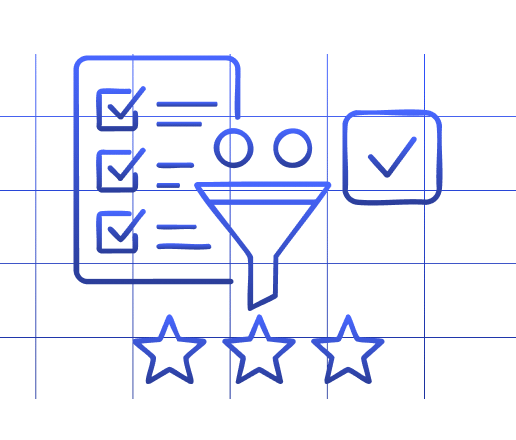Salesforce’s native lead routing capabilities fall short for many growing businesses. The platform’s basic assignment rules can’t handle complex routing logic, territory management, or round-robin distribution at scale. Modern sales teams need more sophisticated systems to ensure leads reach the right reps quickly.
This guide examines the top lead routing apps for Salesforce in 2025 and shows how some companies are building custom routing solutions with spreadsheet automation instead.
Advantages of using dedicated lead routing systems for Salesforce
Faster lead response times
Speed matters in sales. Companies that contact leads within 5 minutes are 21 times more likely to qualify them than those waiting 30 minutes. Dedicated routing tools automatically assign leads based on pre-set criteria, eliminating manual distribution delays and ensuring immediate follow-up.
Balanced workload distribution
Fair lead distribution prevents burnout and resentment among sales teams. Advanced routing systems use round-robin logic, capacity limits, and availability checks to evenly distribute opportunities. This prevents your top performers from being overwhelmed while ensuring newer team members receive enough leads to succeed.
Territory and account-based alignment
Modern B2B sales requires account-based coordination. Robust routing tools can match leads to existing accounts, ensuring consistent rep relationships. They can also enforce territory rules, direct leads to specialists based on industry or product interest, and prevent assignment conflicts.
Performance-based routing
Not all reps perform equally across all lead types. Intelligent routing platforms can analyze historical performance data to assign leads to reps most likely to convert them. This capability alone can significantly boost conversion rates while rewarding your highest performers.
Comprehensive analytics
Dedicated tools provide insights beyond Salesforce’s native reporting. They track routing efficiency, rep capacity, response times, and territory balance. These metrics help revenue operations teams continuously optimize their routing rules for maximum performance.
How Miro implemented lead & account routing using spreadsheet automation
When Miro’s RevOps team faced challenges with lead management during hyper-growth, they needed a solution that wouldn’t add complexity to their tech stack. Rather than purchasing another specialized routing tool, they turned to spreadsheet automation with Coefficient.
“We didn’t want to create blindspots as a result of trying to aggregate and analyze increasing volumes of data from multiple systems,” explained Alexander Bugajski, Miro’s Head of Go-to-Market Strategy.
The team created an automated lead router in Google Sheets that integrates seamlessly with Salesforce. This approach delivered three key benefits:
- Real-time lead velocity tracking: Their custom system triggered automation workflows upon lead acceptance, providing immediate visibility into the sales funnel.
- SLA monitoring and optimization: The team built an SLA tracker showing how leads move through the funnel. SDRs review daily metrics about incoming leads, conversions, and weekly comparisons to continuously improve their processes.
- Flexible account routing: To support Miro’s land-and-expand model, they developed an automated account routing system in spreadsheets. The system pulls data from Salesforce, processes it according to their rules, and pushes assignments back to Salesforce.
What began as a manual process transformed into a self-sustaining workflow requiring just an hour of updates each quarter. This spreadsheet-based routing system has efficiently directed Miro’s sales team to their respective accounts for over three years.
“I recall the hours spent in the old routines,” says Bugajski. “Today, tasks that once consumed hours of my time each week are accomplished in minutes.”
10 Lead routing apps for Salesforce
For teams seeking dedicated routing solutions, here’s a comparison of the top options in 2025:
| Tool | Best For | Starting Price | Key Feature |
| Chili Piper | Meeting scheduling | $15/user/mo | Combined routing & scheduling |
| Lead Assign | AI-driven routing | $25/mo | Intelligent assignment |
| Q-assign | Native SF routing | $21/user/mo | Code-free configuration |
| WorQ | Basic routing | Free | Simple round robin |
| PowerRouter | Visual rule building | $15/user/mo | Visual canvas interface |
| Kubaru | Comprehensive routing | $20/user/mo | All features at one price |
| LeanData | Enterprise routing | Custom | Process automation |
| Dispatcher | Native SF assignment | Not listed | Native SF integration |
| LeadSquared | Field sales teams | Not listed | Mobile optimization |
| Super Round Robin | Fair distribution | Not listed | Instant assignment |
Chili Piper
Chili Piper is a demand conversion platform that helps sales teams automatically schedule appointments with leads. It consolidates chat, routing, and scheduling functionalities into a single solution.
Highlights
- Advanced scheduling capabilities with integrated calendar management
- Form concierge for qualifying and routing prospects from web forms
- Distro module for automated record distribution based on complex rules
Pros
- Unified platform approach: Provides shared routing logic, consolidated reporting, and lower overall costs by combining multiple tools.
- Intuitive interface: Easy to set up and navigate, allowing quick implementation of various meeting types with minimal learning curve.
- Real-time qualification: Automatically qualifies and routes leads while providing instant connection options, significantly improving response times.
Cons
- Pricing structure complexity: Platform fees vary based on lead volume tiers, creating budgeting challenges for organizations with fluctuating lead volumes.
- Integration inconsistencies: Some users report experiencing duplicate entries when integrating with Salesforce, creating additional clean-up work.
- Customer support challenges: Several users have reported difficulties getting timely support for billing and technical issues.
Pricing
As of April 2025, Chili Piper offers various products:
- Instant Booker: $15/user per month
- ChiliCal Teams: $15/users per month
- Chat: $30/users per month + $1000/month platform fee
- Handoff: $30/user per month
- Concierge: $30/user per month + tiered platform fee starting at $150
- Distro: $30/user per month
What do users say about Chili Piper?
Positive review: “It is easy to set up and use. I was able to set up several meeting types within a few minutes. If you need to make changes, it is intuitive to figure out the platform.” – G2 Review
Critical review: “Their customer support is horrible. They suddenly add extra fees, doubling the cost without informing about this. Despite three months of continued efforts to resolve this with them they do not reply but just keep sending new invoices.” – GetApp Review
Support
Chili Piper provides support through their “Customer Love” team with real-time metrics on satisfaction ratings and response times. Support options include knowledge base, chat, email, and phone support.
Lead Assign
Lead Assign offers AI-driven lead routing with real-time data integration. Its platform connects prospects with the right sales reps quickly, optimizing the sales funnel.
Highlights
- AI-driven platform for intelligent lead assignment
- Real-time data integration for timely follow-up
- Lead scoring to prioritize high-value opportunities
Pros
- Advanced routing capabilities: Sophisticated distribution algorithms consider lead source, scoring, and automated follow-ups.
- CRM integration: Connects with your CRM through email or API integrations depending on plan level.
- Customizable workflows: Define specific routing rules based on unique sales processes and territories.
Cons
- Tiered feature limitations: Advanced features like API access and analytics restricted to higher-tier plans.
- Pricing scale challenges: Significant jump between Ultimate ($90/month) and Enterprise ($2500/month) plans.
Pricing
As of May 2025, Lead Assign offers four pricing tiers:
- Basic: $25 per month (10 users free, $25 per additional 10 users)
- Pro: $50 per month (10 users free, $50 per additional 10 users)
- Ultimate: $90 per month (10 users free, $90 per additional 10 users)
- Enterprise: $2500 per month (500 users free, $250 per additional 100 users)
Support
Lead Assign offers tiered support by plan level:
- Basic and Pro plans: Standard support
- Ultimate plan: Phone support and monthly consultation
- Enterprise plan: Dedicated account manager
Q-assign
Q-assign is a Salesforce-native assignment app for intelligent work distribution. It handles routing for multiple objects including Cases, Leads, Opportunities, and Work Orders.
Highlights
- Salesforce-native application leveraging existing data
- Code-free configuration with various assignment options
- Support for dynamic rules and automated reassignment
Pros
- Versatile implementation: According to Anuj Kapoor, Salesforce Administrator at EF Education First, “We have not come up with any use case that is not possible to achieve with this solution.”
- Superior customer service: Users praise the support team as “the best customer support in the industry.”
- Advanced routing capabilities: Features include availability-based routing, account matching, weighted round robin, and AI-powered actions.
Cons
- Minimum user requirement: The 20-user minimum makes this solution less accessible for smaller teams.
- Implementation complexity: While code-free, the powerful routing options require significant planning to optimize.
Pricing
As of April 2025, Q-assign pricing starts at $21 per user per month, with a minimum of 20 users. Volume pricing and nonprofit discounts are available.
What do users say about Q-assign?
Positive review: “Easy to learn, easy to implement and, if we are ever in doubt, the support team jumps in and helps us to deliver. The best customer support in the industry.” – Ortoo Apps Website
Support
Q-assign has a responsive support team based on user testimonials. The company offers a free 30-day trial with full access to features.
WorQ
WorQ offers free Salesforce lead and case routing using round robin and queue-based assignment. It’s ideal for teams needing straightforward automation.
Highlights
- 100% free to use
- Simple round robin and queue assignment
- Works with standard Salesforce objects
Pros
- Zero cost: Fully functional without payment.
- Easy deployment: Simple setup for basic routing needs.
- Native Salesforce integration: No external systems required.
Cons
- Limited advanced features: Lacks AI, analytics, or advanced customization.
- No dedicated support tiers: Community or self-service support only.
- Not suitable for complex routing logic.
Pricing
As of May 2025: Free.
What do users say about WorQ?
Positive: “It’s free and does what we need for basic lead routing.” – Salesforce AppExchange
Critical: “Missing advanced features like skill-based routing and analytics.” – Salesforce AppExchange
Support
No paid support; community and documentation-based assistance.
PowerRouter
PowerRouter provides flexible lead and account routing for Salesforce with a visual routing builder. It supports complex rules, round robin, and account-based assignment.
Highlights
- Visual canvas for building routing rules
- Lead-to-account matching
- Supports round robin, geo, and segment-based routing
Pros
- Easy to set up: Visual interface simplifies rule creation.
- Responsive support: Highly rated for onboarding and workflow edits.
- Adapts to changing business rules: Quickly adjusts to evolving team needs.
Cons
- UI performance issues: Some users report lag or slow loading.
- Limited integrations: Teams notification integration not yet available.
- Debugging challenges: Difficult to trace routing errors at times.
Pricing
As of May 2025:
- Starter: $15/user/month (billed annually)
What do users say about PowerRouter?
Positive: “The PR team was exceptional in onboarding and worked closely with us to understand our requirements and adapt to our changing needs.” – G2
Critical: “Opening and making changes to the PR UI seems to lag / slow to load.” – G2
Support
Hands-on support for onboarding and workflow edits with email and ticketing for all customers.
Kubaru
Kubaru is a Salesforce-native assignment automation tool for leads, cases, and other records. It offers comprehensive features at a simple, flat rate.
Highlights
- Assign any Salesforce object (standard/custom)
- Weighted round robin, load balancing, skill management
- SLA enforcement and duplicate matching
Pros
- All features included: No hidden fees or feature gating.
- Highly flexible: Supports advanced routing, workload management, and “shark tank” claiming.
- Outstanding support: Consistently praised for responsiveness.
Cons
- No free tier: Paid only, though trial is available.
- Volume discounts require contact: Not fully self-serve for large orgs.
- UI may overwhelm simple use cases.
Pricing
As of April 2025: $20/user/month, with volume discounts for 50+ users. Free 30-day trial available.
What do users say about Kubaru?
Positive: “Flawless Performance and Top-Notch Support. Kubaru is an absolute gem of a tool that has become an indispensable asset in our tech stack.” – Kubaru website
Critical: “I wish that I could give them 6 stars!” (No major negatives cited in available reviews)
Support
Free lifetime support for all customers with email and responsive ticketing.
LeanData
LeanData offers a comprehensive Revenue Orchestration Platform for driving the right action, at the right moment, by the right person. It excels at managing complex routing scenarios.
Highlights
- Multiple object support across Salesforce
- Advanced matching and routing with detailed audit trails
- Process automation through drag-and-drop interface
Pros
- Powerful routing logic: Provides “almost everything that Salesforce’s native automations don’t – single-object focused process flows on an accessible drag-and-drop interface with comprehensible audits.”
- Exceptional customer support: According to a G2 review, “LeanData customer support is among the best I’ve encountered in a B2B SaaS company.”
- Quick implementation: Enables teams to “move quickly and also see what’s wrong quickly.”
Cons
- Debugging limitations: “It doesn’t have a debug feature, and that would be really useful.”
- Tiered functionality: Restricts object access based on pricing tier.
Pricing
As of April 2025, LeanData offers four pricing tiers:
- Standard: For Lead object only
- Advanced: For Lead, contact, and account objects
- Premium: For any Salesforce object
- Enterprise: Custom packages for large organizations
What do users say about LeanData?
Positive review: “LeanData routing provides almost everything that Salesforce’s native automations don’t – single-object focused process flows on an accessible drag-and-drop interface with comprehensible audits.” – G2 Review
Critical review: “It doesn’t have a debug feature, and that would be really useful. They have made it easier in recent years to test automations by allowing you to install in a sandbox and then export and import graphs, but there’s no debug feature.” – G2 Review
Support
LeanData provides exceptional customer support that is “among the best I’ve encountered in a B2B SaaS company” according to user testimonials.
Dispatcher
Dispatcher is a Salesforce-native app for round robin lead and case assignment. It allows admins to set assignment and routing rules for standard objects.
Highlights
- Round robin and rules-based assignment
- Works with leads, tasks, cases, and opportunities
- Native Salesforce integration
Pros
- Simple and effective: Easy to set up for basic routing needs.
- No external dependencies: 100% Salesforce-native.
- Supports multiple object types: Not just leads.
Cons
- Limited advanced features: Lacks AI, analytics, or complex rule-building.
- Support details not widely published.
- Not ideal for large or complex teams.
Pricing
As of May 2025: Pricing not publicly listed; typically affordable for AppExchange tools.
What do users say about Dispatcher?
Positive: “Easily set assignment and routing rules for standard Salesforce objects.” – Salesforce AppExchange
Critical: “Missing advanced routing logic and analytics.” – Salesforce AppExchange
Support
Support primarily via Salesforce AppExchange documentation and community forums.
LeadSquared
LeadSquared is a versatile mobile CRM for efficient field operations. It focuses on lead management, task automation, and field sales with strong mobile capabilities.
Highlights
- Mobile CRM with offline capabilities
- Field force management with location tracking
- Customizable navigation and smart lead insights
Pros
- Mobile optimization: Helps sales teams “run their field operations without a glitch.”
- Multilingual support: Supports multiple languages including English, Hindi, Spanish, and more.
- Location-based features: “Find leads nearby” function maximizes field efficiency.
Cons
- Inconsistent app performance: Android app rating of 3.2/5 suggests reliability issues.
- Limited pricing transparency: No public pricing for different tiers.
Pricing
As of April 2025, LeadSquared offers three pricing tiers:
- Lite: Pricing not publicly listed
- Pro: Pricing not publicly listed
- Super: Pricing not publicly listed
Support
Limited information available about LeadSquared’s support options.
Super Round Robin
Super Round Robin focuses on fair, instant, and automated lead distribution in Salesforce. It works with both standard and custom objects for easy setup.
Highlights
- Instant, real-time lead assignment
- Weighted round robin and capacity limits
- Works with any Salesforce object
Pros
- Fast and fair routing: Ensures leads are assigned instantly and evenly.
- Supports capacity management: Prevents overload for new or junior reps.
- No custom code required: Easy for admins to manage.
Cons
- Limited advanced analytics: Focused on assignment, not reporting.
- No AI or skill-based routing: Basic round robin only.
- Support details not widely published.
Pricing
As of March 2025: Pricing not publicly listed; typically affordable for AppExchange tools.
What do users say about Super Round Robin?
Positive: “Say goodbye to manual assignments and routing errors. Automatically assign any standard or custom object with precision.” – Plauti
Critical: “Missing advanced skills/territory matching and analytics.” – Plauti
Support
Support via Salesforce AppExchange documentation and Plauti’s support resources.
The spreadsheet alternative
While dedicated apps offer powerful features, they also add complexity and cost to your tech stack. Many RevOps teams are discovering they can build custom lead routing solutions directly in spreadsheets using tools like Coefficient.
Why use spreadsheets for lead routing?
- Familiar interface: Most RevOps professionals already know spreadsheets, eliminating learning curves.
- Unlimited flexibility: Build exactly what you need without being constrained by an app’s features.
- No additional app costs: Save thousands in annual software fees.
- Rapid iteration: Test and refine routing logic without lengthy implementation cycles.
Coefficient enhances spreadsheets by connecting them directly to your Salesforce data. This allows you to:
- Pull lead and account data into Google Sheets or Excel in real-time
- Create custom routing rules using familiar spreadsheet formulas
- Push assignment decisions back to Salesforce automatically
- Schedule regular refreshes to maintain data accuracy
- Set up alerts when routing exceptions occur
For growing companies like Miro, this approach provides the perfect balance of power and simplicity.
FAQs
What is lead routing in Salesforce?
Lead routing in Salesforce is the process of automatically assigning incoming leads to the appropriate sales representatives based on predefined criteria. Salesforce’s native lead assignment rules allow basic routing based on simple conditions, but most organizations require more sophisticated solutions for complex scenarios like round-robin distribution, territory management, or skill-based routing.
Does Salesforce integrate with other apps?
Yes, Salesforce integrates with thousands of third-party applications through its AppExchange marketplace and API connections. For lead routing specifically, Salesforce can integrate with specialized routing tools like Chili Piper, LeanData, and others profiled in this article. Salesforce also integrates directly with spreadsheet tools like Coefficient, allowing for custom routing solutions built in Google Sheets or Excel.
How to create routing configuration in Salesforce?
To create basic routing configuration in Salesforce:
- Navigate to Setup > Lead Settings > Lead Assignment Rules
- Create a new rule and set it as active
- Add rule entries with criteria and assignment actions
- Choose assignment options (user, queue, etc.)
- Set the order for rule processing
For more advanced routing needs, you have three options:
- Native tools: Use Process Builder or Flow Builder for more complex logic
- AppExchange apps: Install a dedicated routing tool from the marketplace
- Spreadsheet automation: Build custom routing in Google Sheets or Excel using Coefficient to connect to Salesforce data
Ready to simplify your lead routing?
Lead routing doesn’t have to be complicated or expensive. While dedicated apps offer powerful features, they also add complexity to your tech stack. Many RevOps teams are discovering the flexibility of building custom routing solutions directly in spreadsheets.
With Coefficient, you can connect your spreadsheets to Salesforce data in real-time, create custom routing logic, and push assignments back automatically. This approach gives you complete control without the learning curve or subscription costs of another specialized tool.
Miro’s RevOps team proved this works at scale, building a self-sustaining lead routing system that runs with just an hour of maintenance per quarter. Whether you’re managing a small sales team or a global organization, spreadsheet automation might be the simplest solution to your routing challenges.
Ready to try spreadsheet-powered lead routing? Get started with Coefficient’s free plan today.





